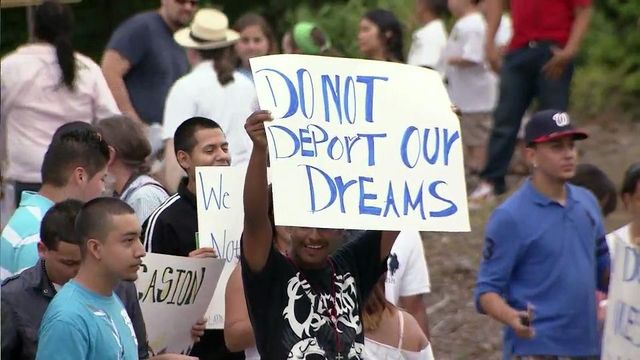Immigrants wait, hope, plan for Obama order
Immigrants in the country illegally already are flooding attorneys' offices with calls to see if they can qualify under President Barack Obama's yet-to-be-announced plan to shield as many as 5 million immigrants from deportation.
Posted — UpdatedObama was to reveal the long-awaited order Thursday night, and Silvio Balcazar said he would be working late at El Centro Hispano in Durham, answering questions from undocumented immigrants in the community.
"They want some kind of hope that they're going to live a productive life, (that) they are not going to be removed from their communities because they are living in those communities for a long time," said Balcazar, community organizing director for the advocacy group.
How many people will qualify and how many years they will have to have lived in the U.S. remain unclear. But those who qualify will be able to get work permits, Social Security numbers and drivers licenses in North Carolina.
"It's a good step. I mean, it's a big step. Being frank, it's the biggest step since Ronald Reagan. So, that's big," Balcazar said.
"People aren’t coming here to ask for welfare. People are coming here to get a better life and get a better job," he said. "They will be providing their talents to North Carolina society, and that, we think, is a big step forward."
Immigration attorney Katy Chavez said many of her clients are hopeful but skeptical. Some don't believe Obama will change the system, she said, while others are afraid to give authorities their names and addresses, not knowing what will happen when the president's temporary order expires in two years.
"This won't lead to residency, it won't lead to citizenship, and it can very well end in 2016," Chavez said.
Ron Woodard, president of anti-amnesty group NC Listen, declined to comment on Obama's immigration plan until details were released.
U.S. Sen.-elect Thom Tillis said Obama's executive action "will exacerbate the problems of an already broken immigration system and send a troubling signal that he has no interest in bipartisan cooperation with Congress."
Although critics accuse the president of offering blanket amnesty to unauthorized immigrants, Chavez and other immigration lawyers say that's not an accurate description.
The plan is expected to protect the parents of children who are U.S. citizens, but it will not extend to parents who brought their children to the country illegally. Many of those children are already protected from deportation by the Deferred Action for Childhood Arrivals program Obama put in place two years ago.
Immigrants who do receive new protection from deportation would be able to get work permits, but they won't be eligible for health care subsidies and they likely won't be eligible for public assistance.
"This is just temporary relief, so there are a lot of things that still need to be done and a lot of people who unfortunately are going to be left out," immigration attorney Marty Rosenbluth said.
Some conservative members of Congress have threatened to pursue a government shutdown if Obama follows through on his promises to act on immigration before the end of the year.
Chavez is dismissive of critics.
"This is the way the system is supposed to work," she said. "If Congress won't act, then the president is allowed to make certain measures. That's why it's not helping everybody – because he doesn't have the power to help everybody. But at least we can help these people, and that's a great thing."
Immigrant advocacy groups in Southern California are planning workshops to inform community members about the order, including a 12,000-person forum at the Los Angeles Convention Center in mid-December, said Jorge-Mario Cabrera, a spokesman for the Coalition for Humane Immigrant Rights of Los Angeles.
The New Mexico Immigrant Law Center is planning a to start a text messaging system targeting immigrants across the state, especially those in rural areas where legal services might not be easily accessible. Immigrant advocates in Florida are planning the same, and will also start a hotline in English and Spanish to keep community members informed.
In New York, immigration lawyers and nonprofits are preparing to hold clinics to help screen immigrants for the program.
• Credits
Copyright 2024 by WRAL.com and the Associated Press. All rights reserved. This material may not be published, broadcast, rewritten or redistributed.





